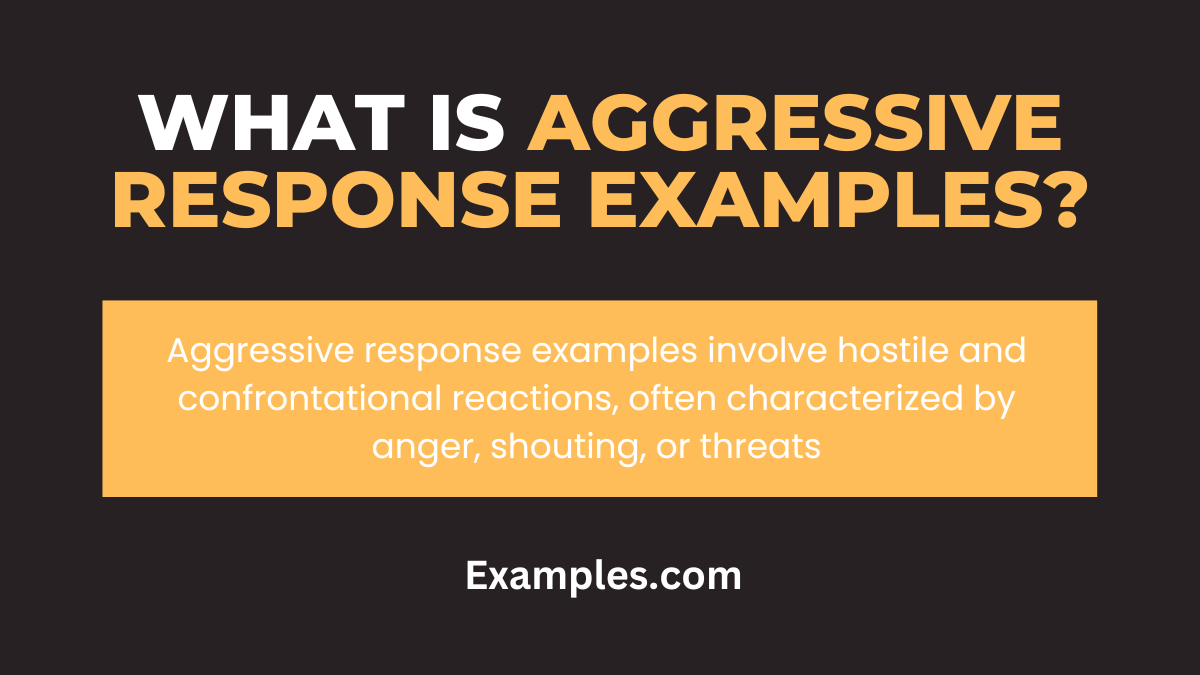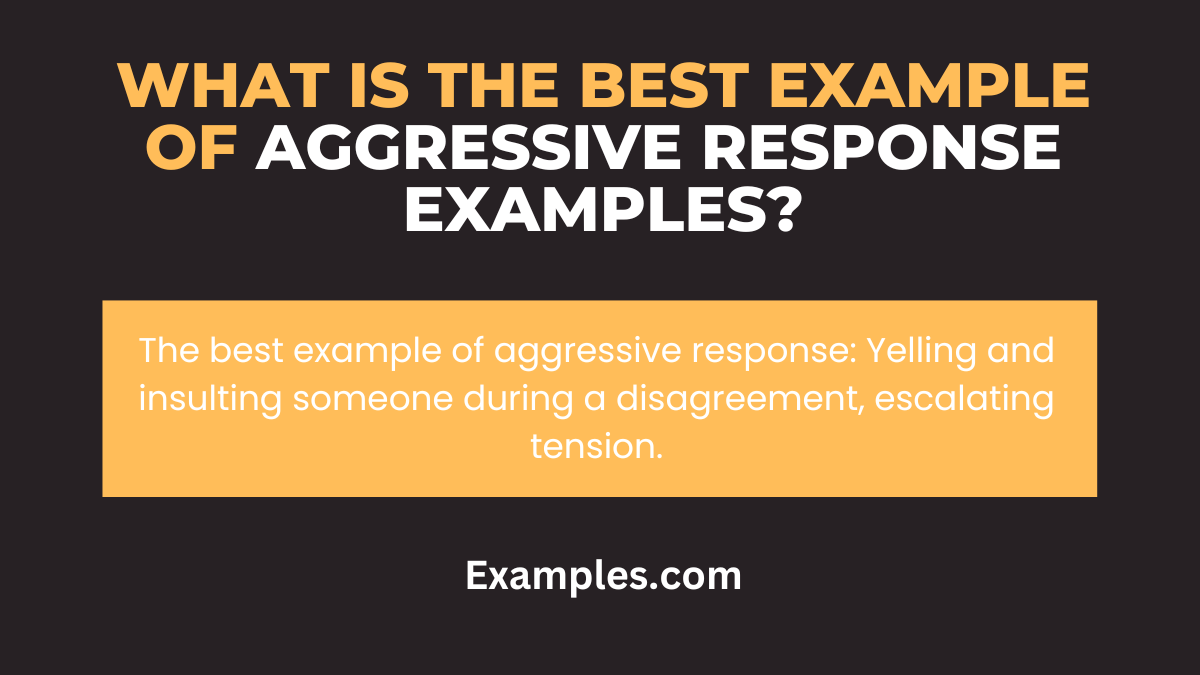Aggressive Response Examples
Aggressive Response Examples provide a comprehensive understanding of confrontational interactions. This guide delves into various forms of aggressive communication, offering practical examples and tips for handling such situations. Whether it’s verbal spats or non-verbal cues, understanding these examples helps in developing strategies to manage conflicts effectively. We explore the nuances of aggressive behavior, equipping you with the knowledge to respond appropriately and maintain composure in challenging conversations.
What is Aggressive Response Examples?

Aggressive response examples illustrate the various ways individuals express anger, frustration, or dominance in communication. These responses often manifest through harsh words, raised voices, and confrontational body language. Understanding these examples is crucial for recognizing and addressing aggressive behavior in personal and professional settings.
What is the Best Example of Aggressive Response Examples?

The quintessential example of an aggressive response is a verbal attack, where an individual uses harsh language, accusations, or threats to dominate a conversation. This often involves shouting, interrupting, and employing a tone that is intimidating and dismissive.
30 Examples of Aggressive Response
Aggressive responses in communication, characterized by hostility and assertiveness, can escalate conflicts and damage relationships. This article highlights 20 examples of aggressive responses, showcasing various Aggressive Communication Styles like verbal attacks, intimidation, and sarcasm. Understanding these examples is crucial in recognizing and addressing aggressive behavior in interpersonal interactions, whether it’s in personal relationships, the workplace, or other social settings. Each example serves as a reminder of the importance of maintaining respectful and constructive communication.
- “Just shut up! You have no idea what you’re talking about!” – An example of verbal aggression and disrespect, shutting down the conversation abruptly.
- “Do it because I said so, not because it makes sense!” – An example of commanding and demanding communication, disregarding others’ opinions.
- “You always mess things up!” – A blaming statement, generalizing a person’s behavior negatively.
- “You’re such an idiot!” – A verbal attack, directly insulting another person’s intelligence.
- “That’s the dumbest idea I’ve ever heard!” – A dismissive attitude, devaluing others’ contributions.
- “I don’t care what you think!” – An example of disregard for others’ opinions, demonstrating a lack of empathy.
- “You better do it, or else!” – An aggressive threat, implying negative consequences.
- “No one asked for your opinion!” – Dismissive and belittling, devaluing another person’s input.
- “You’re always wrong!” – An absolute statement, criticizing and diminishing another person.
- “I don’t need your stupid advice!” – Rejecting assistance or input in a hostile manner.
- “It’s all your fault!” – Blaming and refusing to acknowledge one’s own role in a situation.
- “You’re worthless!” – A deeply insulting and demoralizing statement.
- “I don’t have time for your nonsense!” – Dismissive and impatient, showing disrespect for others’ concerns.
- “You’re too sensitive!” – Belittling a person’s feelings and undermining their emotions.
- “Stop talking. I’m right, you’re wrong!” – Overbearing behavior, not allowing room for discussion.
- “Keep your mouth shut if you don’t know anything!” – Intimidation tactic to silence someone.
- “You’ll regret crossing me!” – Threatening future repercussions.
- “Your work is always subpar!” – Constant criticism without constructive feedback.
- “I’m not interested in your excuses!” – Disregarding explanations or reasons.
- “You’re a failure!” – A harsh and demoralizing judgment of someone’s abilities or actions.
- “You never do anything right!” – An absolute and demeaning statement, generalizing someone’s abilities negatively.
- “I don’t need to listen to this garbage!” – Disrespectfully dismissing what the other person is saying.
- “You’re just a loser!” – A personal insult aimed at undermining someone’s self-worth.
- “That’s the stupidest thing I’ve ever heard!” – Aggressively criticizing someone’s idea or opinion.
- “You better listen to me, or you’ll regret it!” – Using intimidation to enforce authority or control.
- “Why can’t you ever get it right?” – A rhetorical question that implies incompetence.
- “I’m not interested in your pathetic excuses!” – Dismissing explanations in a belittling manner.
- “If you had a brain, you’d agree with me!” – Insulting someone’s intelligence to enforce one’s viewpoint.
- “Your opinion is worthless!” – Directly devaluing another person’s thoughts or beliefs.
- “Just do as you’re told and stop arguing!” – Commanding compliance without regard for discussion or input.
Impacts of Aggressive Response
- Damaged Relationships: Aggressive responses often harm personal and professional relationships.
- Increased Conflict: They escalate conflicts instead of resolving them.
- Stress and Anxiety: Both the aggressor and recipient may experience heightened stress.
- Negative Reputation: Aggressive behavior can tarnish one’s reputation.
- Reduced Problem-Solving Efficiency: It hinders effective problem-solving.
- Health Risks: Prolonged aggression can lead to health issues like high blood pressure.
- Workplace Disharmony: In professional settings, it disrupts teamwork and productivity.
- Emotional Harm: It can cause emotional trauma and distress.
- Legal and Disciplinary Consequences: Aggressive responses can lead to legal problems.
- Impaired Judgment: It often leads to rash decisions and impaired judgment.
How to Respond to an Aggressive Person?
- Stay Calm: Maintain your composure to avoid escalating the situation.
- Listen Actively: Show that you are listening and understanding their concerns.
- Use Neutral Language: Avoid provocative words or tones.
- Set Boundaries: Politely set limits on aggressive behavior.
- Seek to Understand: Try to understand the root cause of their aggression.
- Avoid Retaliation: Responding with aggression only worsens the situation.
- Use De-escalation Techniques: Employ tactics to lower the tension.
- Seek Mediation: If necessary, involve a neutral third party.
- Protect Yourself: Prioritize your safety in threatening situations.
- Follow Up: Address the underlying issues when the situation has calmed.
Aggressive responses is crucial for effective communication. This article has explored various aggressive behaviors, highlighting their detrimental impacts on relationships and environments. By recognizing these behaviors and embracing healthier alternatives, individuals can foster more constructive and respectful interactions, ultimately promoting harmonious communication and positive outcomes in personal and professional settings.



